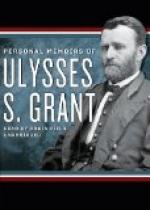CHAPTER XXXVII. SIEGE OF VICKSBURG.
Chapter XXXVIII. Johnston’s movements—fortifications
at HAINES’S bluff
—explosion of the mine—explosion
of the second mine—preparing
for the
assault—the flag of
truce—meeting with Pemberton—negotiations
for
surrender—accepting the
terms—surrender of Vicksburg.
Chapter XXXIX. Retrospect of the
campaign—Sherman’s movements—proposed
movement upon Mobile—A painful
accident—ordered to report
at Cairo.
Volume one begins:
CHAPTER I.
Ancestry—birth—boyhood.
My family is American, and has been for generations, in all its branches, direct and collateral.
Mathew Grant, the founder of the branch in America, of which I am a descendant, reached Dorchester, Massachusetts, in May, 1630. In 1635 he moved to what is now Windsor, Connecticut, and was the surveyor for that colony for more than forty years. He was also, for many years of the time, town clerk. He was a married man when he arrived at Dorchester, but his children were all born in this country. His eldest son, Samuel, took lands on the east side of the Connecticut River, opposite Windsor, which have been held and occupied by descendants of his to this day.
I am of the eighth generation from Mathew Grant, and seventh from Samuel. Mathew Grant’s first wife died a few years after their settlement in Windsor, and he soon after married the widow Rockwell, who, with her first husband, had been fellow-passengers with him and his first wife, on the ship Mary and John, from Dorchester, England, in 1630. Mrs. Rockwell had several children by her first marriage, and others by her second. By intermarriage, two or three generations later, I am descended from both the wives of Mathew Grant.
In the fifth descending generation my great grandfather, Noah Grant, and his younger brother, Solomon, held commissions in the English army, in 1756, in the war against the French and Indians. Both were killed that year.
My grandfather, also named Noah, was then but nine years old. At the breaking out of the war of the Revolution, after the battles of Concord and Lexington, he went with a Connecticut company to join the Continental army, and was present at the battle of Bunker Hill. He served until the fall of Yorktown, or through the entire Revolutionary war. He must, however, have been on furlough part of the time—as I believe most of the soldiers of that period were—for he married in Connecticut during the war, had two children, and was a widower at the close. Soon after this he emigrated to Westmoreland County, Pennsylvania, and settled near the town of Greensburg in that county. He took with him the younger of his two children, Peter Grant. The elder, Solomon, remained with his relatives in Connecticut until old enough to do for himself, when he emigrated to the British West Indies.




